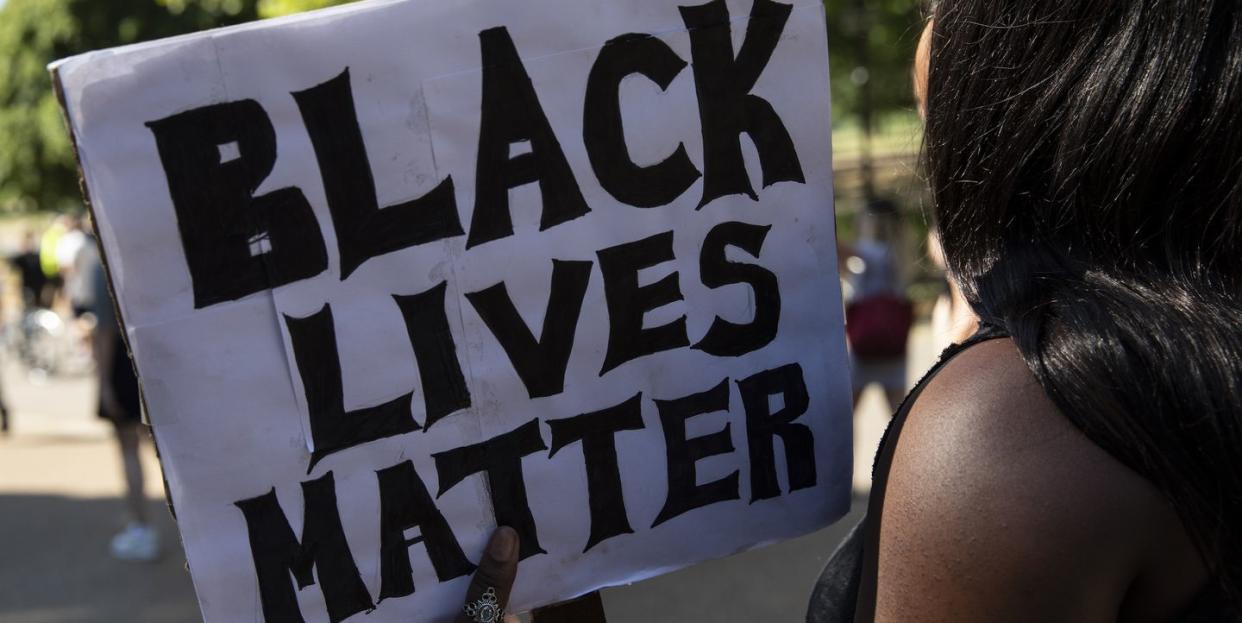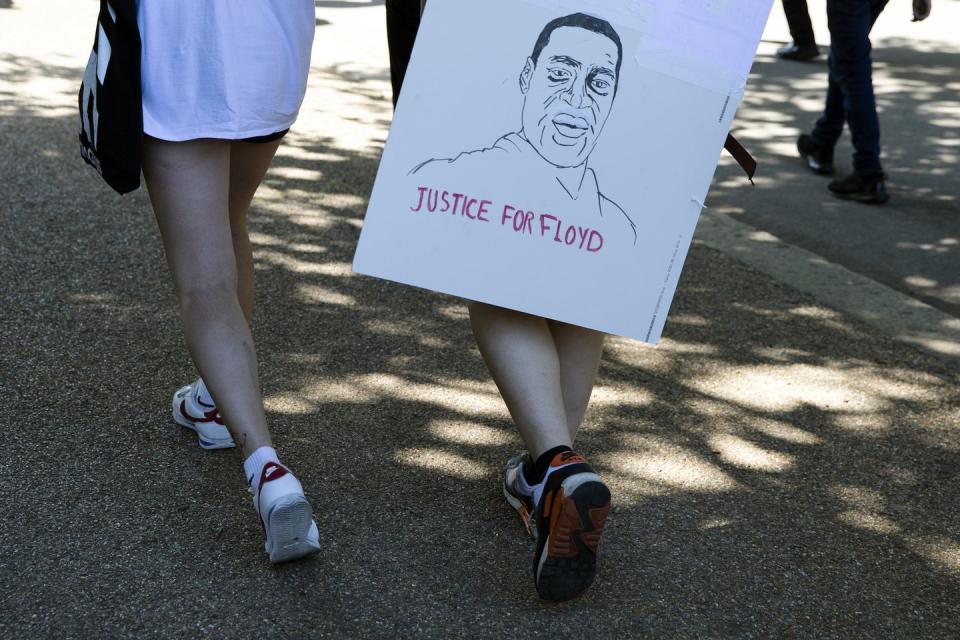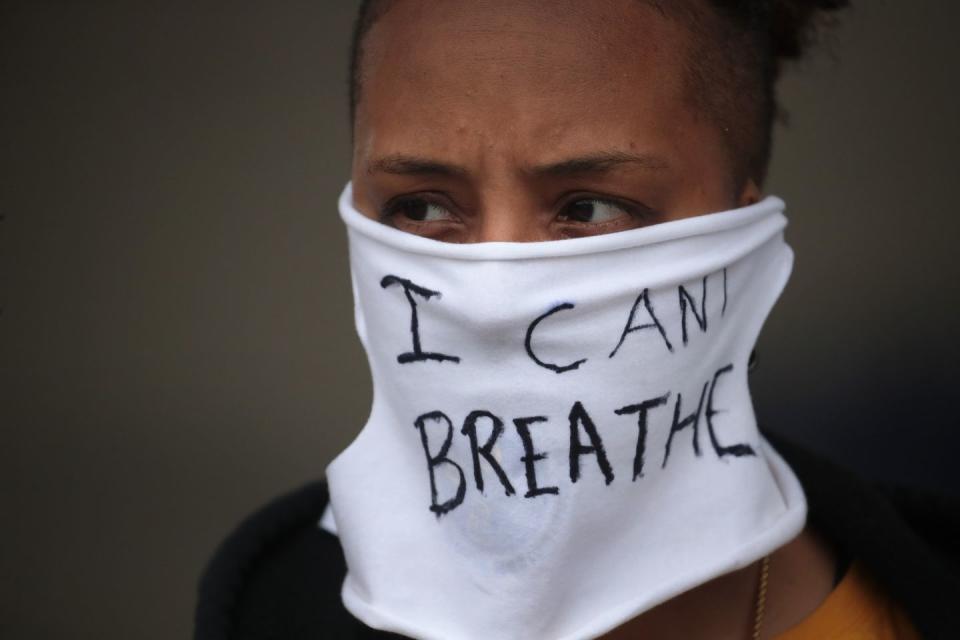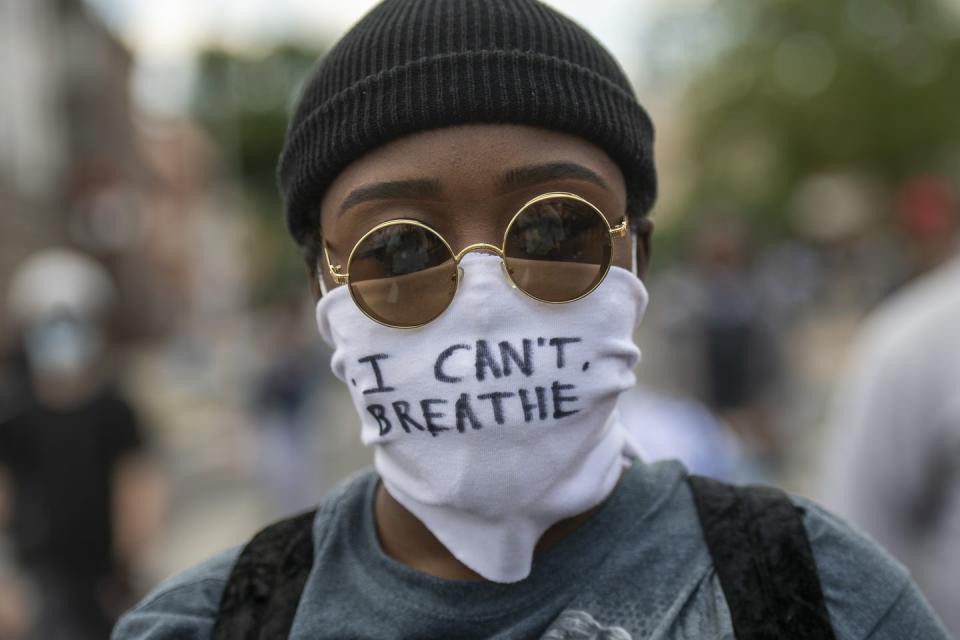How To Protest Safely And Stop The Spread Of Coronavirus

As peaceful demonstrations and acts of civil unrest in America roll on, thousands of international protestors are showing solidarity by spilling onto their own streets. From Krakow to Rio de Janeiro, the brutal murder of George Floyd, an unarmed black man, by Derek Chauvin, a white policeman, has lit the touch paper for anti-racism activism the world over.
On Sunday, London’s Trafalgar Square played host to a mass Black Lives Matter rally in support of American protestors, and more demonstrations are penned in for the days ahead. And while this collective anger, grief and desire for police reform cannot and should not be undermined, health officials are increasingly worried that mass gatherings could result in a spike in Covid-19 cases.

Speaking specifically about the US protests, Maimuna Majumder, a computational epidemiologist at Boston Children’s Hospital and Harvard Medical School, told The Atlantic that, “all things considered, there’s little doubt that these protests will translate into increased risk of transmission for Covid-19.” Meanwhile Mark Shrime, a public-health researcher at Harvard, told the title, “With so many protests happening, that are getting so much bigger, I don’t think it’s a question of if, but when and where.” But after months in lockdown, tens of thousands are understandably prepared to take that risk in order to show solidarity and fight police brutality. As Majumder put it: "Structural racism has been a public-health crisis for much longer than the pandemic has."
If you're planning to show your face at a protest in the coming weeks, it's integral that you take every possible precaution for the your own health and those closest to you. To help, we've gathered some advice on avoiding infection during a peaceful protest. They don't offer any guarantees, but they'll no doubt help.
Try to socially distance
A very tricky (bordering on impossible) one that isn’t entirely up to you, but try to maintain a 6-feet distance from your fellow protestors at all times. Experts agree that it’s the best tool we have for minimising the risk of Covid-19 spreading between groups of people, regardless of the context. If you do gather with other people, keep it to a small familiar group and be transparent with each other about symptoms and previous exposure.
Harm reduction for protests in a pandemic:
•wear your mask + eye protection + heat resistant gloves
•yelling can spread droplets, choose signs, drums, or similar noise makers
•stick with a buddy group to keep your unknown contacts low
•carry water + hand sanitizer + bandages— Ellie Murray (@EpiEllie) May 30, 2020
Assess your own condition, risk and ability to spread
It goes without saying that if you are displaying symptoms of Covid-19, you should not be going outdoors, let alone joining a protest. The same goes for if you’re feeling generally unwell – the symptoms for Covid-19 are surprisingly wide-ranging. Take a look at what the NHS knows about signs of the virus so far.
Similarly, you should take the vulnerable people in your life into account. If you live or have contact with people who are more susceptible to the virus and its potentially fatal impact – older people and those with underlying health issues – then it's highly advisable that you consider their safety and wellbeing. You can still donate to support Black Lives Matter protesters in the UK and overseas, even if you can't join them.
Wear a mask (and bring several)
The true effectiveness of masks – especially disposable and fabric options – is disputed, but one thing’s for sure: they’re better than nothing.
Officials have stressed the importance of wearing a mask during protests, especially as many people will have travelled from other areas to join demonstrations in virus-hit cities, risking a potentially dangerous spread across the country. Cover your nose and mouth.
As you’ll no doubt be exposing your mask to regular droplets while speaking during the protest, it’s advisable that you bring several masks and replace them as soon as they are damp. Undo by unhooking it from your ears, rather than pulling down from your mouth. Common sense, but it’s easy to trip up.

A positive anti-body test is no guarantee
The accuracy of antibody tests is debated within the scientific community, and there’s still a huge amount we don’t know about what a positive result actually means. The Centers for Disease Control and Prevention states that it is currently unknown how many antibodies you’d need to safeguard your immune system against Covid-19. It’s also not known for certain how long a coronavirus sufferer’s natural immunity holds up. Just because you think you've had the virus, that doesn't guarantee you're either immune, or can't spread it to your fellow protestors.
Yelling can spread the virus
In her informative Twitter thread, Ellie Murray, epidemiology assistant professor at Boston University School of Public Health, suggests that signs and placards, as well as drums and “similar noise makers”, are preferable to shouting at a large volume. Counterproductive and unsatisfactory as that may sound, it’s because yelling can help spread infected droplets into the air.
Consider self-quarantining afterwards
Symptoms of Covid-19 can take between three to fourteen days to appear. You’ll be surrounding yourself with a lot of people and possibly embarking on train journeys, so self-quarantining for 14 days after the protest would dramatically decrease your risk of passing on the virus.
Yes, symptoms can take 3-14 days to show up and you can spread infection even before that. So, definitely consider self-quarantining if you can (& if you aren’t out protesting again tomorrow)
— Ellie Murray (@EpiEllie) May 31, 2020
Carry hand sanitiser
Good advice for any trip outdoors. Make sure that you use it regularly if you find yourself touching people or surfaces. It will likely have a negative impact on your skin, however, so check out our advice around moisturising here.

Avoid touching your face
Another piece of advice that doesn’t just apply to protests. Your mouth, nose and eyes are all entry points for the virus, and as such you should be placing your hands on or near them. Wearing sunglasses is a good way to limit the chance of infecting yourself with virus particles.
Stay hydrated
Not corona-related, but protesting for an extended amount of time during the current heatwave can result in severe dehydration. Carry a drink with you and don’t share it with anyone else at the protest.
You Might Also Like

